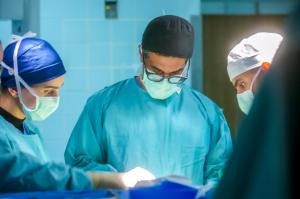A Surgical Milestone in Riyadh: How Robotic Operation Redefined the Future of Brain Surgery
RIYADH, SAUDI ARABIA, October 23, 2025 /EINPresswire.com/ -- When a 68-year-old man arrived at King Faisal Specialist Hospital and Research Centre (KFSHRC) in Riyadh with headaches and fading concentration, surgeons turned to a new frontier in precision medicine: removing a deep-seated brain tumor through a fully robotic procedure.
Instead of guiding instruments by hand under a microscope, the surgical team used robotic arms steered by a three-dimensional optical navigation system to perform what is believed to be the world’s first fully robotic intracranial tumor resection.
The outcome marked a major leap in recovery speed, with the four and a half centimeter tumor removed in about an hour. The patient, fully awake and stable, was discharged in less than 24 hours, recovering nearly four times faster than patients who undergo conventional brain surgery.
“The system gives us a steadiness and accuracy no human hand can maintain for that long,” said Dr. Homoud Aldahash, a skull base tumor specialist who led the procedure. “We could map and remove the tumor with almost zero disturbance to the surrounding brain. The patient’s recovery speaks for itself.”
Robotic neurosurgery remains rare even in the world’s top medical centers, largely because of the complexity of operating inside the skull and the millimeter-scale precision it requires. Traditional resections rely on a surgeon’s hands and eyesight, while the new robotic platform eliminates tremor, stabilizes every micro movement, and allows continuous three-dimensional visualization of the surgical field.
The breakthrough adds to KFSHRC’s growing record in robotic medicine. The institution has already performed the world’s first robotic heart and liver transplants, drawing attention from leading centers in Europe and North America eager to study its methods.
Observers say the Riyadh operation reflects a broader global trend in hospital investment in automation and precision-guided surgery. If early outcomes continue to hold, robotic neurosurgery could become a new frontier in minimally invasive care, once confined to theory, now tested successfully in a living human brain.
KFSHRC has been ranked first in the Middle East and North Africa and fifteenth globally among the world’s top 250 academic medical centers (2025). It also holds the title of most valuable healthcare brand in the Middle East (Brand Finance 2025) and appears in Newsweek’s lists of the World’s Best Hospitals 2025, Best Smart Hospitals 2026, and Best Specialized Hospitals 2026, recognition that mirrors its ambition to place Saudi medicine on the global map of innovation.
Instead of guiding instruments by hand under a microscope, the surgical team used robotic arms steered by a three-dimensional optical navigation system to perform what is believed to be the world’s first fully robotic intracranial tumor resection.
The outcome marked a major leap in recovery speed, with the four and a half centimeter tumor removed in about an hour. The patient, fully awake and stable, was discharged in less than 24 hours, recovering nearly four times faster than patients who undergo conventional brain surgery.
“The system gives us a steadiness and accuracy no human hand can maintain for that long,” said Dr. Homoud Aldahash, a skull base tumor specialist who led the procedure. “We could map and remove the tumor with almost zero disturbance to the surrounding brain. The patient’s recovery speaks for itself.”
Robotic neurosurgery remains rare even in the world’s top medical centers, largely because of the complexity of operating inside the skull and the millimeter-scale precision it requires. Traditional resections rely on a surgeon’s hands and eyesight, while the new robotic platform eliminates tremor, stabilizes every micro movement, and allows continuous three-dimensional visualization of the surgical field.
The breakthrough adds to KFSHRC’s growing record in robotic medicine. The institution has already performed the world’s first robotic heart and liver transplants, drawing attention from leading centers in Europe and North America eager to study its methods.
Observers say the Riyadh operation reflects a broader global trend in hospital investment in automation and precision-guided surgery. If early outcomes continue to hold, robotic neurosurgery could become a new frontier in minimally invasive care, once confined to theory, now tested successfully in a living human brain.
KFSHRC has been ranked first in the Middle East and North Africa and fifteenth globally among the world’s top 250 academic medical centers (2025). It also holds the title of most valuable healthcare brand in the Middle East (Brand Finance 2025) and appears in Newsweek’s lists of the World’s Best Hospitals 2025, Best Smart Hospitals 2026, and Best Specialized Hospitals 2026, recognition that mirrors its ambition to place Saudi medicine on the global map of innovation.
Riyadh
King Faisal Specialist Hospital and Research Centre
email us here
Legal Disclaimer:
EIN Presswire provides this news content "as is" without warranty of any kind. We do not accept any responsibility or liability for the accuracy, content, images, videos, licenses, completeness, legality, or reliability of the information contained in this article. If you have any complaints or copyright issues related to this article, kindly contact the author above.


